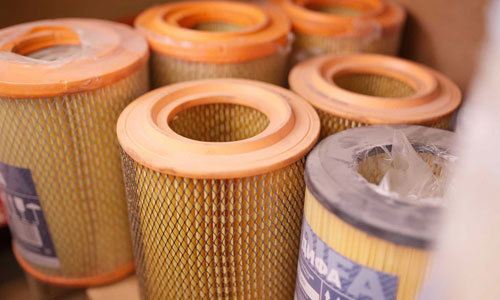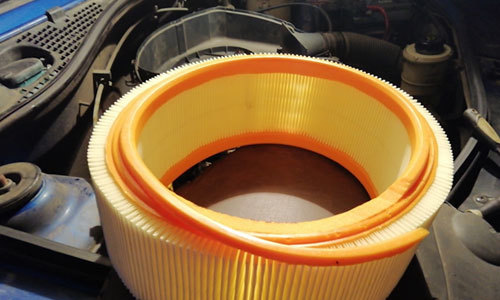How to Choose the Right Air Filter Element for Your Mining Trucks
2025-09-11
How to Choose the Right Air Filter Element for Your Mining Trucks
Table of Contents
Understanding Air Filters and Their Importance
Types of Air Filters for Mining Trucks
Factors to Consider When Choosing Air Filters
Different Filter Materials and Their Benefits
Understanding Filter Efficiency Ratings
Maintenance Tips for Air Filter Elements
Common Mis
How to Choose the Right Air Filter Element for Your Mining Trucks
Table of Contents
- Understanding Air Filters and Their Importance
- Types of Air Filters for Mining Trucks
- Factors to Consider When Choosing Air Filters
- Different Filter Materials and Their Benefits
- Understanding Filter Efficiency Ratings
- Maintenance Tips for Air Filter Elements
- Common Misconceptions About Air Filters
- Conclusion
- FAQs
Understanding Air Filters and Their Importance
Air filters play a crucial role in the performance and longevity of mining trucks. These trucks operate under extremely challenging conditions, including high levels of dust, dirt, and debris. An effective air filter element ensures that the engine receives clean air, which is vital for optimal combustion and efficiency. Without a high-quality air filter, mining trucks can suffer from reduced power, increased fuel consumption, and potential engine damage.
In mining applications, the air filter is not just a component; it is an essential protector of the engine's integrity and performance. This guide will equip you with the knowledge necessary to select the right air filter element for your mining trucks, ensuring they operate at peak performance levels.
Types of Air Filters for Mining Trucks
When choosing air filters for mining trucks, it’s essential to understand the various types available:
1. Panel Filters
Panel filters are rectangular and often used in various machinery, including mining trucks. They are designed to fit into specific housing and provide reliable air filtration.
2. Cartridge Filters
Cartridge filters feature a cylindrical shape and usually contain a pleated filtering material. They are known for their high dirt-holding capacity and are ideal for heavy-duty applications.
3. Foam Filters
Foam filters are made from porous foam material that traps dirt and dust. They are generally washable and reusable, making them an economical choice for long-term use.
4. Oil Bath Filters
Oil bath filters use a combination of oil and mesh to trap particulates. The oil captures dust particles, making them suitable for extremely dusty environments.
Each type of filter serves a different purpose and has unique advantages, depending on the specific mining conditions.
Factors to Consider When Choosing Air Filters
To ensure you select the appropriate air filter element, consider the following factors:
1. Environmental Conditions
Mining environments can vary significantly. Factors such as humidity, temperature, and the level of dust and debris must be considered when choosing air filters.
2. Engine Specifications
Understanding your mining truck’s engine specifications, including the make and model, is crucial. The air filter must be compatible with the engine’s design and airflow requirements.
3. Filter Life Expectancy
Choose filters with a longer life expectancy to minimize replacement frequency and maintenance costs.
4. Cost-Effectiveness
While it might be tempting to opt for the cheapest option, consider the overall value, including filter efficiency and lifespan. A more expensive filter may save money in the long run by requiring fewer replacements.
5. Manufacturer Recommendations
Always consult the manufacturer’s recommendations for air filter elements. They often have specifications and best practices that ensure the best performance for their equipment.
Different Filter Materials and Their Benefits
The material of the air filter significantly affects its performance. Here are some common materials used in air filters for mining trucks:
1. Cellulose
Cellulose filters are made from natural fibers and are effective for general air filtration. They are affordable but may not be the best choice for extremely dusty environments.
2. Synthetic Fiber
Synthetic filters offer superior filtration capabilities and are more durable than cellulose. They are resistant to moisture and can hold more dirt, making them ideal for mining applications.
3. HEPA Filters
High-Efficiency Particulate Air (HEPA) filters capture 99.97% of particles larger than 0.3 microns. These filters are perfect for environments requiring high filtration efficiency, although they can be more expensive.
4. Carbon Filters
Carbon filters can reduce odors and remove volatile organic compounds (VOCs) from the air. They are often used in conjunction with other filters for enhanced performance.
Selecting the right filter material can greatly impact the efficiency and longevity of your mining trucks.
Understanding Filter Efficiency Ratings
Filter efficiency is crucial for ensuring that your mining trucks operate smoothly. Here are some common terms related to filter efficiency:
1. Nominal Efficiency
Nominal efficiency indicates the percentage of particles that the filter can capture. A higher number means better performance.
2. Absolute Efficiency
Absolute efficiency measures the filter's ability to trap particles of a specific size. This is particularly important for heavy-duty applications where engine protection is paramount.
3. Dust Holding Capacity
This rating refers to how much dust a filter can hold before it needs to be replaced. A higher dust holding capacity means less frequent changes.
By understanding these efficiency ratings, you can make an informed decision when selecting air filters for your mining trucks.
Maintenance Tips for Air Filter Elements
Proper maintenance is key to maximizing the lifespan and performance of air filter elements. Here are some tips to keep in mind:
1. Regular Inspections
Perform regular inspections of air filters to assess their condition. Check for visible dirt accumulation and any signs of damage.
2. Clean or Replace Filters as Needed
Depending on the type of filter, you may be able to clean it instead of replacing it entirely. Follow the manufacturer’s instructions for cleaning or replacing filters.
3. Monitor Engine Performance
Keep an eye on the performance of your mining trucks. A noticeable decrease in power or fuel efficiency can indicate that the air filter needs attention.
4. Keep Replacement Filters On Hand
Having a stock of replacement filters can help minimize downtime in case of unexpected issues.
Common Misconceptions About Air Filters
There are several misconceptions about air filters that can lead to poor choices:
1. All Filters Are the Same
Many believe that all air filters perform equally. In reality, different filters are designed for various applications and environments.
2. Higher Price Equals Better Quality
While price can be an indicator of quality, it is not always the case. Evaluate filters based on specifications rather than just cost.
3. You Only Need to Replace Air Filters When They Are Dirty
Ignoring scheduled maintenance can lead to engine damage. Regularly replace filters according to the manufacturer’s guidelines, regardless of their appearance.
Conclusion
Choosing the right air filter element for your mining trucks is vital for maintaining engine performance and longevity. By understanding the types of filters available, their materials, efficiency ratings, and maintenance needs, you can make an informed decision that aligns with your operational requirements. Investing time and resources into selecting the best air filter not only maximizes the efficiency of your equipment but also minimizes long-term costs and potential engine damage.
FAQs
1. How often should I replace the air filter in my mining truck?
The replacement frequency varies based on environmental conditions and usage. Generally, it’s advisable to check filters every 500-1000 hours of operation.
2. Can I clean my air filter instead of replacing it?
This depends on the type of filter. Some filters, like foam, can be washed, while others may need replacement. Always follow the manufacturer’s guidelines.
3. What are the signs that my air filter needs to be replaced?
Signs include reduced engine power, increased fuel consumption, and unusual sounds from the engine.
4. Are more expensive filters always better?
Not necessarily. It’s essential to evaluate filters based on specifications and compatibility with your mining truck rather than price alone.
5. Can a dirty air filter damage my engine?
Yes, a dirty air filter can restrict airflow, leading to incomplete combustion and potential engine damage over time. Regular maintenance is crucial.
By carefully considering these aspects, we can ensure that the air filter elements you choose will deliver optimal performance, protect your investment, and keep your mining operations running smoothly.
Key words:
Related News
How often does the air filter change?
The air filter element is mainly used to block impurities such as dust and sand in the air.
2024-05-22
What are the car filters? When do car filters need maintenance?
As an oil filter, it is generally replaced together with the oil during maintenance.
2024-05-22
The choice of filter manufacturers should be considered comprehensively
Before choosing a filter manufacturer, you must understand the relevant background of the manufacturer.
2024-05-22










